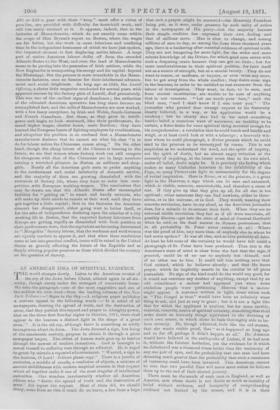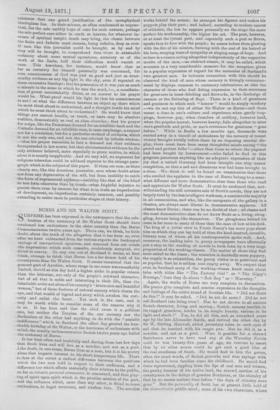ANAMERICAN IDEA OF SPIRITUAL EVIDENCE.
THE world changes slowly. Listen to the American version of the cry of the Jews before Christ, uttered again in all sin- cerity, though surely under the strangest of conceivable forms. We take the paragraph—one of the most suggestive and one of the saddest wo ever read—from the leading columns of the New York Tribune:---," Signs in the Sky.—A religious paper publishes
a curious appeal in the following words It is asked of all newspapers, desiring the spread of truth, and the destruction of error, that they publish this request and prayer to Almighty power, that on the three first Sunday nights in October, 1871, there shall appear in the heavens a distinct light in the shape of a great cross.'" It is the old cry, although there is something so wildly incongruous about its form. The Jews demand a sign, but being of the nineteenth century, propose to obtain it through, a pious newspaper league. The oldest of human wails goes up to heaven through the newest of modern inventions. God is besought to reveal himself to suffering man through an editorial. He is urged to grant by miracle a repeated advertisement. " Waisted, a sigu in the heavens, 0 Lord I Editors please copy." There is a jumble of centuries, a muddle of creeds, a confusion of objects, a mixture of ancient childlikeness with modern sceptical acumen in that request which all together make it one of the snost singular of intellectual curiosities. One weeders involuntarily whether all American editors who "desire the spread of truth and the destruction of error " did repeat the request. Most of them did, we should fancy, some from an idea it could do no harm, a few from a hope that such a prayer might be answered—the Heavenly President being put, as it were, under pressure by such unity of action in the newspapers of His party—but the majority because their simple confrSre has expressed their own feeling and that of millions more. Man is slow to change, and among millions of tneu to-day, as among the Jews three thousand years ago, there is a hankering after material evidence of spiritual truth. They are not hungering for more light, for the wider and more minute knowledge of the Divine, for which good men strive with such a desparing crave because they can get so little ; but for more comfortableness in their spiritual position, for faith itself not as a source of strength, but as a mental luxury. They do not want to reason, or meditate, or inquire, or even trust any more, but to get away from the whole conflict ; they desire some sign in the heavens, in order to be entitled to rest evermore from the labour of investigation. They want, in fact, to be sure, and from mental constitution are unable to be sure of anything that is not concrete. " Let me touch your face," said the blind man, "and I shall know if I can trust you." The journalist who penned that strange request to his fraternity clearly believed, in a way, or his application would be a mockery ; but he clearly also had in his mind something besides belief, a conscious want of assurance, an inability to be certain, a fierce desire for some spiritual thing material enough for his comprehension ; a revelation that he could touch and handle and weigh, or at least could look at with a telescope ; a heavenly wit- ness whom he could photograph, a divine promise which he could send to the printers to be stereotyped by reams. This is not scepticism as we uuderstaud the word, not the spirit of inquiry, not the spirit of doubt, bat an almost angry irritation at the necessity of inquiring, at the latent sense that in his own mind, under all belief, doubt might be. It is precisely the feeling which makes so many Catholics luxuriate in the infallibility of the
Pope, so many Protestants fight so unreasonably for the dogma of verbal inspiration. Here iu Rome, or at the printers, is a great
light in the Heavens, a sign which can be seen and examined, which is visible, concrete, unmistakable, and therefore a cause of rest. If they give up that they give up all, for all else is too spiritual; other assurance they can find nowhere, either in them- selves, or in the universe, or iu God. They would, wanting their concrete revelation, have to cry aloud, as the American journalist
does, for a miracle to re-cement their faith. When they see no
external visible revelation they feel as if all were uncertain, all possibly illusion—get into the state of mind of General Garibaldi when he said, as his final answer to Roman pretensions, that in all probability St. Peter never existed at all I Where was the proof of him, any more than of anybody else to whom he had never spoken? It was all idea, and as idea probably all false.
At least he felt none of the certainty he would have felt could a photograph of St. Peter have been produced. That this is the American's state of mind is clear from the fact that the sign, if granted, could be of no use to anybody but himself, and of no other use to him. It could tell him nothing save that God existed, which he believes already ; and that He hears prayer, which he implicitly asserts in his circular to all pious journalists. No sign of the kind could do the world any good, for it would not convince any doubter of anything, except that by an odd coincidence a meteor had appeared just when some credulous people were petitioning Heaven that a meteor
might appear. A sentence written in light, some axiom such as "The Gospel is true," would have been an infinitely wiser thing to ask, and just as easy to grant ; but it is not a light like that for which the applicant is anxious, but for some earthly., material, concrete, source of spiritual certainty, something that shall make doubt on heavenly things equivalent to the doubting of one's own senses, in which alone he feels thoroughly able to be- lieve securely. He, though educated, feels like the old woman, that she wants visible proof, that "as it happened so long ago and so far off, perhaps it didn't happen at all." Dr. Johnson would have believed in the earthquake of Lisbon, if he had seen it, without the faintest hesitation, yet the evidence for it which he disbelieved was a thousand times better than the testimony of any one pair of eyes, and the probability that one inau had been dreaming much greater than the probability that such a consensus of testimony could have been invented. This American cannot be sure that two parallel lines will never meet unless he follows them up to the end of their eternal journey.
There must be thousands of such men in England, as well as America, men whose doubt is not doubt so much as inability of belief without evidence, and incapacity of comprehending evidence not limited by the senses, and it is in their oxistence that one grand justification of the metaphysical theologians lies. In their science, so often condemned as unprac- tical, lies the sole earthly hope of cure for such natures, perhaps the Sole perfect cure either in earth or heaven, for whatever in-
• oreaso of spiritual insight death may bring, the chasm between the fluito and Infinite must remain, being infinite, deep as ever. If men like this journalist could be brought, as by and by they will be brought, to comprehend that there is attainable -certainty about some mental operations, certainty as of the work of the limbs, half their difficulties would vanish at QUO. This American, for instance, would know that as far as certainty for himself personally was concerned, his .own consciousness of God was just as good and just as trust- worthy evidence as any big light in the sky, even if repeated on three successive Sundays; that his possession of it was just as much a miracle in the sense in which he uses the word, i.e., a manifesta- tion of power unmistakably divine, as an answer to his prayer would be. What proof would his light be that his consciousness as not ? or what the difference between an object up there which he must think about to understand, and a thought inside his mind which he must think about to understand ? He would know that 'things you cannot handle, or touch, or taste may be absolute 'realities, demonstrably as real as clam-chowder ; that his prayer ler a sign, like the Protestant demand for an infallible book and the Catholic demand for an infallible man, is mere surplusage, a request not for a revelation, but for a particular method of evidence, which is not the only one, and not the one selected by infinite wisdom, —that his prayer resembles in fact a demand not that evidence be superseded in law courts, but that circumstantial evidence be the only evidence believed, more especially to prove motive, in which alone it is usually inapplicable. And we may add, no argument for religious toleration could be adduced superior to the strange pare- .graph which is the subject of this paper. If there are men, as there .clearly are, like this American journalist, men whose doubt arises -not from any depravation of the will, but from inability to catch the force of supraseusual evidence—inability like that of the blind to test form otherwise than by touch—what frightful injustice to .punish them even by censure for what is in truth an imperfection of development, an imperfection certainly common, and possibly
• extending to entire races in particular stages of their history.































 Previous page
Previous page